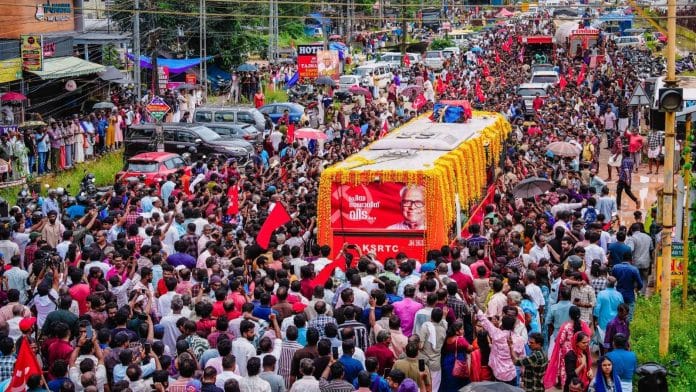Once the ideological backbone of India’s welfare state, the Left is in gradual eclipse. In West Bengal, where the Left Front ruled uninterrupted for over three decades, its cadre base has crumbled under the dual assault of identity-based politics and grassroots disillusionment. In Tripura, a resurgent BJP displaced the communists by adopting the Left’s welfare tools while adding cultural nationalism and centralised patronage.
On the other hand, Kerala—the last bastion—is no longer immune to the national tide. While the CPI(M) still holds the ground electorally, its ideological edges are being increasingly dulled by the compulsions of governance.
This eclipse is not merely an electoral event, but also an intellectual one. In 2004, the Left commanded 61 seats in the Lok Sabha; in 2024, it mustered barely two. The slogans that emerged from the Left parties centred on public sector protection, price rise, and constitutional safeguards felt morally urgent but politically stranded.
“Mazdooron ka haq do,” “Jumlon nahi, rozgaar do,” and “Loktantra bachao, samvidhan bachao” rang true, but failed to cut through the new political discourse dominated by aspirational nationalism and identity affirmations. What was once a compelling force visible in radical land reforms, trade union consolidation, and transformative policies like the 2005 MGNREGA has now receded into a marginal presence on the national stage, struggling to speak to a new India that looks and aspires differently.
Internal rift led to decline
Repeated internal contradictions within the Left have compounded this crisis of relevance. The persistence of an upper-caste intellectual dominance within its leadership has constrained its capacity to engage substantively with Ambedkarite critiques. Similarly, while feminist idioms in Left discourse have largely remained declaratory, this detachment is striking in a context where women form a large part of the informal economy—as domestic workers, caregivers, and participants in gig labour marked by insecurity and low pay.
Spatially, too, the Left remains confined to a few enclaves, its language rarely reaches the Hindi heartland where national power is decided. The Left’s crisis is therefore not simply an organisational failure but an epistemic one: it has yet to translate enduring social demands into a narrative and institutional programme suited to a precarious electorate.
India’s younger electorate, shaped by precarious employment and digital aspirations, finds little meaning in words like “proletariat” or “bourgeoisie.” The Left’s historical grammar, rooted in industrial labour and state-led redistribution, struggles to capture this new reality.
Moreover, the rhetoric of “communism” or even “socialism” no longer resonates with younger generations, who associate these terms either with bureaucratic inertia or with failed state experiments abroad.
Also read: America under Trump — more than democratic backsliding, less than a right-wing revolution
Left outflanked on its own terrain
It is noteworthy how the Left’s vacuum has been skillfully filled by right-wing populism. The Modi government, like populist regimes elsewhere, has mastered the art of welfare without rights. Schemes like PMGKAY, Ayushman Bharat, and direct cash transfers are presented not as entitlements secured through social struggle but as benevolent gifts of a paternalistic state rather than rights earned through social struggle.
This mirrors global trends—Donald Trump’s stimulus checks, Jair Bolsonaro’s family allowances, Viktor Orbán’s “illiberal welfare state.” The Right has thus appropriated the language of redistribution while infusing it with nationalism and moral discipline. The irony is that the Left, once the custodian of welfare, now finds itself outflanked on its own terrain.
The stakes of this eclipse are high. Without the Left’s insistence on welfare as a matter of rights, India risks sliding into a politics of charity. Without its scrutiny, privatisation of health and education accelerates unchecked, and the climate crisis can be subsumed under token gestures of green nationalism.
The absence of a strong Left opposition weakens democratic checks, leaving Parliament without a coherent critique of the state–market nexus. It was the Left that ensured the birth of India’s most ambitious social safety net, MGNREGA. It is precisely this imagination that must be revived if the Indian welfare state is not to be reduced to a patchwork of electoral freebies.
But revival requires reinvention. The old anti-capitalist idioms like “proletariat” or “bourgeoisie” do not speak to a highly globalised, digitised society. Instead of nostalgia for the proletariat, the Left must articulate the struggles of the “precariat,” which includes delivery riders, sanitation workers, contractual teachers, and women in unpaid care work who live without safety nets in a volatile economy.
It must reimagine alliances, integrating Ambedkarite, feminist, and environmentalist agendas as central rather than peripheral. It must root itself in local struggles like housing rights in the cities, agrarian distress in the villages, while offering a national vision that connects these fragments. And it must learn to communicate not only through rallies but through the idioms of digital culture, where identity and aspiration are constructed.
The Indian Left has not merely lost votes; it has lost its idiom, but history is full of examples where new idioms have breathed life into old movements. For the Indian Left, the choice is stark: to remain a relic of the past, rehearsing a rhetoric that no longer lands, or to craft a language of justice that makes sense in 2025. If it wishes to matter again, the Left must stop mourning the proletariat and start organising the precariat.
The author is associated with Global Justice Program, Yale University and featured at the University of Chicago, USA. She tweets at maleeha_shafi
(Edited by Saptak Datta)







Struggle for issues of the common people. Do not manufacture issues when there are none. Yes, this is the hard reality that some of the people need to come to terms with. This unnecessary romanticisation of struggle served no good.
Its full of insights and nicely summed up. A great contribution to Left discourse.
Whatever prompts the writer has thrown into chatgpt, it hasn’t worked it’s a real mishmash of someone else’s work pirated into this article
Anti-capitalism and smoking cigarettes are characteristic of leftists, it is impossible to let go of those things.